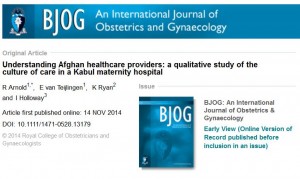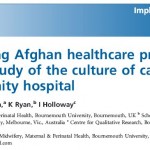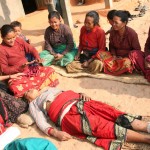HSC postgraduate student Rachel Arnold just had the first paper from her research in Afghanistan accepted by the scientific journal BJOG. Her paper analyses the culture of a Kabul maternity hospital to understand its impact on the care of perinatal women and their babies. A heavy workload, too many complicated cases and poor staff organisation lead to a low quality of maternity care. Cultural values, social and family pressures influenced the motivation and priorities of healthcare providers.
The centrality of the family and family obligations in Afghan society has emerged as a major theme. Another theme is the struggle for survival – as health care providers work to support their families, to maintain the power that they have, and to survive within a hospital system where fear rather than compassion appears to drive and motivate. Rachel presented some of the key issues at the 2013 GLOW conference in Birmingham. Rachel is supervised by Professors Immy Holloway, Kath Ryan (LaTrobe University, Australia) and Edwin van Teijlingen.

Rachel’s paper Understanding ‘Afghan healthcare providers: a qualitative study of the culture of care in a Kabul maternity hospital’ can be found here. The paper is Gold Open Access.
Prof. Edwin van Teijlingen
Centre for Midwifery, Maternal & Perinatal Health
 Maternity research in Afghanistan
Maternity research in Afghanistan New paper CMMPH PhD student Sheetal Sharma
New paper CMMPH PhD student Sheetal Sharma










 From Sustainable Research to Sustainable Research Lives: Reflections from the SPROUT Network Event
From Sustainable Research to Sustainable Research Lives: Reflections from the SPROUT Network Event REF Code of Practice consultation is open!
REF Code of Practice consultation is open! BU Leads AI-Driven Work Package in EU Horizon SUSHEAS Project
BU Leads AI-Driven Work Package in EU Horizon SUSHEAS Project ECR Funding Open Call: Research Culture & Community Grant – Apply now
ECR Funding Open Call: Research Culture & Community Grant – Apply now ECR Funding Open Call: Research Culture & Community Grant – Application Deadline Friday 12 December
ECR Funding Open Call: Research Culture & Community Grant – Application Deadline Friday 12 December MSCA Postdoctoral Fellowships 2025 Call
MSCA Postdoctoral Fellowships 2025 Call ERC Advanced Grant 2025 Webinar
ERC Advanced Grant 2025 Webinar Update on UKRO services
Update on UKRO services European research project exploring use of ‘virtual twins’ to better manage metabolic associated fatty liver disease
European research project exploring use of ‘virtual twins’ to better manage metabolic associated fatty liver disease